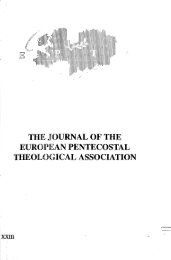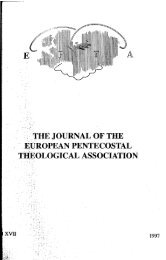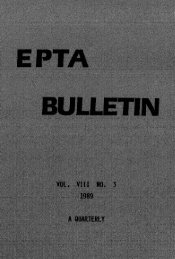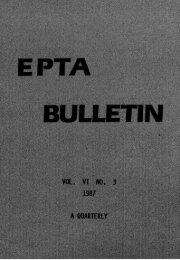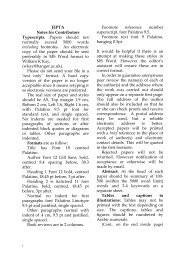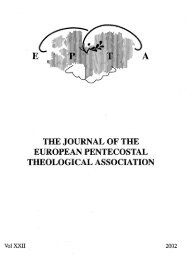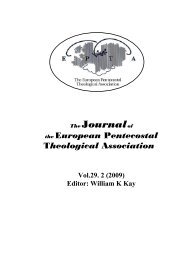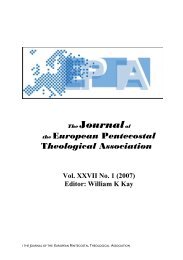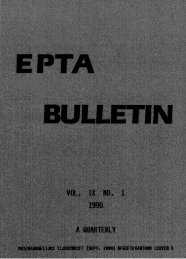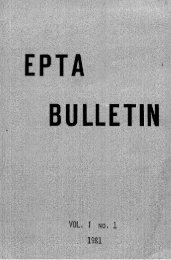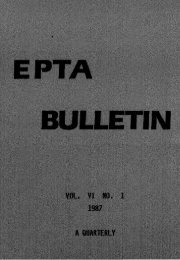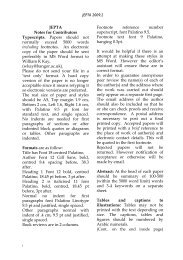jepta 2001 21 - European Pentecostal Theological Association
jepta 2001 21 - European Pentecostal Theological Association
jepta 2001 21 - European Pentecostal Theological Association
You also want an ePaper? Increase the reach of your titles
YUMPU automatically turns print PDFs into web optimized ePapers that Google loves.
The Journal of the <strong>European</strong> <strong>Pentecostal</strong> <strong>Theological</strong> <strong>Association</strong>, Vol. XXI, <strong>2001</strong><br />
Arthur Booth-Clibborn: <strong>Pentecostal</strong> Patriarch: James Robinson<br />
Booth (1858-1955), the eldest and most naturally gifted daughter of her family, in<br />
consolidating the work of the Army in both France and Switzerland where she<br />
was known affectionately as La Mar chale (the Field-Marshall). William Booth<br />
soon conferred on Clibborn the rank of Colonel and one of Arthur's main<br />
responsibilities was to work on the production of the first French edition of War<br />
Cry. The two were married in 1887 and the freshly styled Booth-Clibborns'<br />
continued their work which often involved them travelling apart. They were a<br />
well matched couple though their relationship was not without its tensions,<br />
inherent in the fact that "Colonel" Arthur, with "the fierce pride of an Irish<br />
ari~tocrat",~ was not the type of man to play second fiddle to his wife, La<br />
Mar chale or not.' Both were strong-willed, single-minded and zealous soulwinners.<br />
In a final tribute to her father, one daughter (Evangeline or Evelyn) described him<br />
as "finely built and endowed with much physical strength ...( H)e for many years<br />
gloried in the early struggles of the Salvation Army, welcoming pain,<br />
persecution, and even physical injury, for the furtherance of Christ's Kingd~m".~<br />
He was tall, handsome with a pleasant baritone singing voice that blended well in<br />
duets with Kate's clear soprano singing voice. He was a poet, writer, composer<br />
of hymns in French and translator of John Henry Newman into German. To his<br />
wife he was "a mighty man of God, especially called and remarkably qualified'<br />
with an the disturbing intensity implied in that description, overwhelming in his<br />
enthusiasms and inflexible in matters of principle. Physically courageous, he<br />
wore for years on his army uniform the silver medal awarded to him by the<br />
President of France for saving, while on holiday, a man from drowning in the sea<br />
off Boulogne. Such was the impact of their work in France that when they<br />
transferred to the Netherlands, they were welcomed by Queen Wilhelmina;<br />
occasionally Dutch cabinet ministers were seen at their meetings.<br />
By the mid-1890s, the Salvation Army had left behind the first enthusiastic flush<br />
I<br />
General Booth insisted that his daughters on marriage retain the Booth name as part of their<br />
new name.<br />
From Some Notes on the life of Stanley Booth-Clibborn, p. 2, wrinen by himself and found in<br />
the Booth-Clibborn Collection. The Clibborns were more Anglo-Irish gentry than aristocracy.<br />
When Arthur joined the Salvation Army, "he gave to the General a considerable fortune, made<br />
out of the Clibborn family's linen factories at Bessbrook" (p. 1).<br />
' Ibid, 2, "We have come across many papers showing his hesitations before marriage on what<br />
his status would be, and his literalist clinging to Pauline texts on the man as the head of the<br />
woman. Catherine apparently dismissed these saying 'Paul got it wrong, and when we get to<br />
heaven, I'll tell him"'!<br />
' Catherine Booth-Clibborn, A Poet ofpraise: a Tribute to Arthur Booth-Clibborn, Marshall,<br />
Morgan and Scott: London (1939) 33.<br />
Tarolyn Scott, op. cit., 197. This parenthetic statement was written in her letter of resignation<br />
from the Salvation Anny and addressed to her father.<br />
of its incipient phase and had entered its period of organisation when the<br />
processes of routinisation and formalisation became more evident. Kate was to<br />
say later, "I was Territorial Commander of France, and I couldn't make a<br />
corporal a sergeant without permission from London".' Routinisation, as<br />
deadening as it was inevitable, was a process that was to lead three of the Booth<br />
children out of the Army forever.' As early as 1891, Booth-Clibbom had written<br />
to the General requesting liberty to preach what he called the full, plain Gospel of<br />
the Sermon on the Mount, a plea that carried within it three themes that<br />
challenged the Army's official stance - pacifism, divine healing and<br />
premillennialism. The General refused any such freedom and frustration was<br />
compounded in 1896 when the Booth-Clibboms were told to leave France, for<br />
which Kate had an abiding vision and passion, and take command in the<br />
Netherlands, a country with which she felt no particular bond. It was a testing<br />
time for an avowed pacifist like Booth-Clibborn to be in the Netherlands in the<br />
period between the two Anglo-South African (Boer) Wars. In 1898, conscription<br />
was introduced in the Netherlands and with rumours of war rampant, Arthur took<br />
to writing on pacifist themes but was prevented from publishing by .headquarters<br />
in London. The Booth-Clibboms' disillusionment with the Army finally reached<br />
a point when they ceased to dedicate their later-born children into the ranks. In<br />
1900, defying the will of headquarters, they made representations to the Dutch<br />
government on behalf of pacifists in prison. The influence of his Quaker background<br />
continued to run deep. The "Hallelujah Quaker", as he was dubbed on his<br />
first anival in France, stuck with his vow of 1881: "I stated that I could never<br />
forgo any of the essential truths of Quakerism, and I entered the work on that<br />
understanding".'<br />
THE INFLUENCE OF DOWIE<br />
If pacifism owed much to Booth-Clibborn's Quaker background, his interest in<br />
divine healing and premillennialism was further stimulated by contact with John<br />
Alexander Dowie, through the latter's magazine Leaves of Healing and then by<br />
meeting him in London and Paris in 1900. Dowie arrived in England primarily to<br />
recruit lace workers as key personnel for his new factory in Zion City. In a series<br />
of well advertised meetings in London, riots and disorder, instigated in many<br />
cases by medical students, followed his preaching and the laying of hands on<br />
those seeking healing. The London press was largely unimpressed and the<br />
Financial News considered his healings fake: "there is no more fruitful ground<br />
I Carolyn Scott, op. cit., 198.<br />
' Ibid, 179. The three were Catherine, Herbert and Ballington. The last set up the Volunteers in<br />
America in 1896. It was organised on lines similar to that of the Salvation Army. Ballington<br />
and his wife, Maud, resigned from the Army in a disagreement over the General's autocratic<br />
leadership.<br />
' Carolyn Scott, op. cit.. 54.



